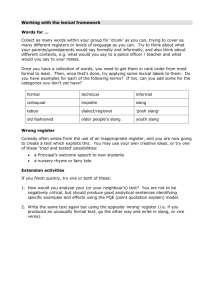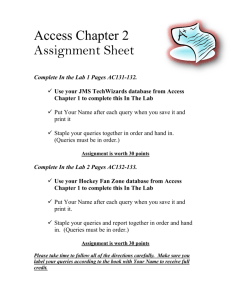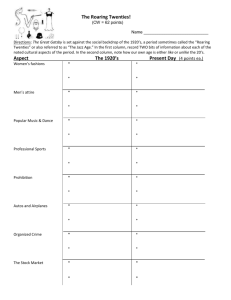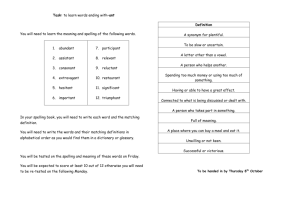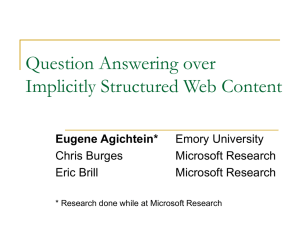Full paper
advertisement
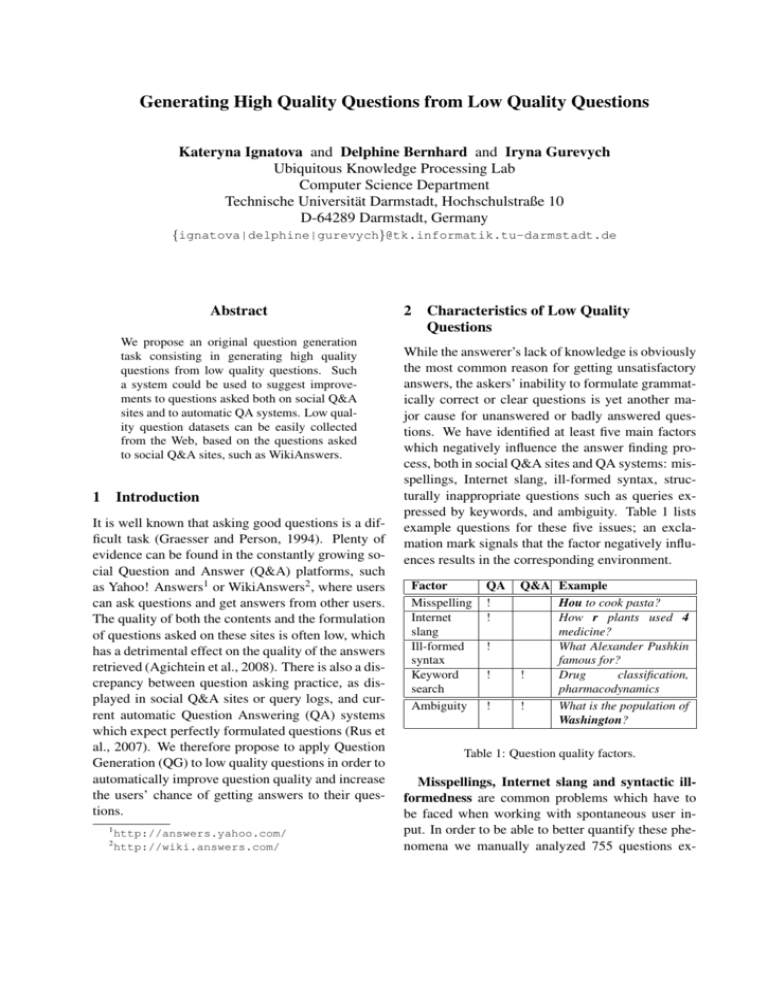
Generating High Quality Questions from Low Quality Questions
Kateryna Ignatova and Delphine Bernhard and Iryna Gurevych
Ubiquitous Knowledge Processing Lab
Computer Science Department
Technische Universität Darmstadt, Hochschulstraße 10
D-64289 Darmstadt, Germany
{ignatova|delphine|gurevych}@tk.informatik.tu-darmstadt.de
Abstract
We propose an original question generation
task consisting in generating high quality
questions from low quality questions. Such
a system could be used to suggest improvements to questions asked both on social Q&A
sites and to automatic QA systems. Low quality question datasets can be easily collected
from the Web, based on the questions asked
to social Q&A sites, such as WikiAnswers.
1
Introduction
It is well known that asking good questions is a difficult task (Graesser and Person, 1994). Plenty of
evidence can be found in the constantly growing social Question and Answer (Q&A) platforms, such
as Yahoo! Answers1 or WikiAnswers2 , where users
can ask questions and get answers from other users.
The quality of both the contents and the formulation
of questions asked on these sites is often low, which
has a detrimental effect on the quality of the answers
retrieved (Agichtein et al., 2008). There is also a discrepancy between question asking practice, as displayed in social Q&A sites or query logs, and current automatic Question Answering (QA) systems
which expect perfectly formulated questions (Rus et
al., 2007). We therefore propose to apply Question
Generation (QG) to low quality questions in order to
automatically improve question quality and increase
the users’ chance of getting answers to their questions.
1
2
http://answers.yahoo.com/
http://wiki.answers.com/
2
Characteristics of Low Quality
Questions
While the answerer’s lack of knowledge is obviously
the most common reason for getting unsatisfactory
answers, the askers’ inability to formulate grammatically correct or clear questions is yet another major cause for unanswered or badly answered questions. We have identified at least five main factors
which negatively influence the answer finding process, both in social Q&A sites and QA systems: misspellings, Internet slang, ill-formed syntax, structurally inappropriate questions such as queries expressed by keywords, and ambiguity. Table 1 lists
example questions for these five issues; an exclamation mark signals that the factor negatively influences results in the corresponding environment.
Factor
Misspelling
Internet
slang
Ill-formed
syntax
Keyword
search
Ambiguity
QA
!
!
!
!
!
Q&A Example
Hou to cook pasta?
How r plants used 4
medicine?
What Alexander Pushkin
famous for?
!
Drug
classification,
pharmacodynamics
!
What is the population of
Washington?
Table 1: Question quality factors.
Misspellings, Internet slang and syntactic illformedness are common problems which have to
be faced when working with spontaneous user input. In order to be able to better quantify these phenomena we manually analyzed 755 questions ex-
tracted from the Yahoo! Answers social Q&A site
and found that 18% of them were misspelled, 8%
contained Internet slang, and 20% were ill-formed.
While misspellings, Internet slang or ill-formedness
usually do not prevent human users from understanding and answering questions, noisy text data
cannot be correctly processed by most NLP tools,
which therefore impedes automatic answer extraction in QA systems.
Keyword queries are the natural way for most
people to look for information. In an experiment
destined to gather real user questions on a university website, Dale (2007) showed that only about
8% of the queries submitted were questions, despite instructions and examples destined to make
users ask full natural language questions. Another
study by Spink and Ozmultu (2002) showed that
only half of the queries asked to the Ask Jeeves
QA Web Search engine were questions. Keyword
queries are also commonly found on social Q&A
sites. In such cases, the user’s information need and
the type of the question are unclear, which represents a significant problem for both machines and
humans. For example, the following question from
Yahoo! Answers “Drug classification, pharmacodynamics, Drug databases” gets a low quality answer “Is there a question here? Ask a question if you
want an answer”. In a similar way, the QuALiM3
QA system produces the following message in response to a keyword search: “Hint: Asking proper
questions should improve your results”.
Ambiguity is another important issue which we
would like to mention here. The question “What is
the population of Washington?” is ambiguous for
both QA systems and humans answering questions
on Q&A platforms, and might therefore need special question generation approaches for reformulating the question in order to resolve ambiguity. Since
disambiguation usually requires additional contextual information which might not always be available, we will not tackle this issue here.
3
Task Description
The various examples given in the previous section
call for the application of question generation techniques to improve low quality questions and subse3
http://demos.inf.ed.ac.uk:8080/qualim/
quently ameliorate retrieval results. The steps which
have to be performed to improve questions range
from correcting spelling errors to generating fullfledged questions given only a set of keywords.
3.1
Main Subtasks
Spelling and Grammatical Error Correction
The performance of spelling correction depends on
the training lexicon, and therefore unrecognized
words, which frequently occur in user-generated
content, lead to wrong corrections. For instance, as
we have shown in (Bernhard and Gurevych, 2008),
the question “What are the GRE score required
to get into top 100 US universities?”, where GRE
stands for Graduate Record Examination, is badly
corrected as “What are the are score required to
get into top 100 US universities?” by a general
purpose dictionary-based spelling correction system
(Norvig, 2007). Spelling correctors on social Q&A
sites fare no better. For example, in response to the
question “Wat r Wi-Fi systems?”, both Yahoo! Answers and WikiAnswers suggest to correct the word
‘Wi-Fi’, but do not complain about the Internet slang
words ‘wat’ and ‘r’. Internet slang should therefore
be tackled in parallel to spelling correction. Grammar checking and correction is yet another complex
issue. A thorough study of the kind of grammatical
errors found in questions would be needed in order
to correctly handle them.
Question generation from a set of keywords
The task of question generation from keywords
is very challenging and, to our knowledge, has
not been addressed yet. The converse task, extracting keywords from user queries, has already
been largely investigated both for Question Answering and Information Retrieval (Kumaran and Allan, 2006). Moreover, it is important to generate not only grammatical but also important (Vanderwende, 2008) and useful questions (Song et al.,
2008). For this reason, we suggest to reuse the questions previously asked on Q&A platforms to learn
the preferred question types and patterns given specific keywords. Additional information available on
Q&A sites, such as user profiles, could further help
to generate questions by taking into consideration
the preferences of a user. The analysis of user profiles has been already proposed by Jeon et al. (2006)
and Liu et al. (2008) for predicting the quality of answers and the satisfaction of information seekers.
3.2
Datasets
Evaluation datasets for the proposed task can be
easily obtained online. For instance, the WikiAnswers social Q&A site repertories questions as well
as manually tagged paraphrases for the questions
which include low quality question reformulations.
For example, the question “What is the height of
the Eiffel Tower?” is mapped to the following paraphrases: “Height eiffel tower?”, “Whats the height
of effil tower?”, “What is the eiffel towers height?”,
“The height of the eiffel tower in metres?”, etc.4
3.3
Evaluation
Beside an intrinsic evaluation of the quality of generated questions, we propose an extrinsic evaluation of
the generated questions which would consist in measuring the impact on automatic QA of (i) low quality
questions vs. (ii) automatically generated high quality questions.
Acknowledgments
This work has been supported by the Emmy Noether
Program of the German Research Foundation (DFG)
under the grant No. GU 798/3-1, and by the
Volkswagen Foundation as part of the LichtenbergProfessorship Program under the grant No. I/82806.
References
Eugene Agichtein, Carlos Castillo, Debora Donato, Aristides Gionis, and Gilad Mishne. 2008. Finding highquality content in social media. In Proceedings of the
international conference on Web search and web data
mining (WSDM ’08), pages 183–194.
Delphine Bernhard and Iryna Gurevych. 2008. Answering Learners’ Questions by Retrieving Question Paraphrases from Social Q&A Sites. In Proceedings of the
3rd Workshop on Innovative Use of NLP for Building Educational Applications, ACL 2008, pages 44–
52, Columbus, Ohio, USA, June 19.
Robert Dale. 2007. Industry Watch: Is 2007 the Year of
Question-Answering? Natural Language Engineering, 13(1):91–94.
4
For the full list of paraphrases, see http:
//wiki.answers.com/Q/What_is_the_height_
of_the_Eiffel_Tower
Arthur C. Graesser and Natalie K. Person. 1994. Question Asking During Tutoring. American Educational
Research Journal, 31:104–137.
Jiwoon Jeon, W. Bruce Croft, Joon Ho Lee, and Soyeon
Park. 2006. A Framework to Predict the Quality of
Answers with Non-Textual Features. In Proceedings
of the 29th annual international ACM SIGIR conference on Research and development in information retrieval (SIGIR ’06), pages 228–235.
Giridhar Kumaran and James Allan. 2006. A Case
for Shorter Queries, and Helping User Create Them.
In Proceedings of the Human Language Technology
Conference and the Annual Conference of the North
American Chapter of the Association for Computational Linguistics, pages 220–227, Rochester, New
York, April. Association for Computational Linguistics.
Yandong Liu, Jiang Bian, and Eugene Agichtein. 2008.
Predicting Information Seeker Satisfaction in Community Question Answering. In Proceedings of the 31st
annual international ACM SIGIR conference on Research and development in information retrieval (SIGIR ’08), pages 483–490, New York, NY, USA. ACM.
Peter Norvig. 2007. How to Write a Spelling Corrector. [Online; visited February 22, 2008]. http:
//norvig.com/spell-correct.html.
Vasile Rus, Zhiqiang Cai, and Arthur C. Graesser. 2007.
Experiments on Generating Questions About Facts.
In Alexander F. Gelbukh, editor, Proceedings of CICLing, volume 4394 of Lecture Notes in Computer
Science, pages 444–455. Springer.
Young-In Song, Chin-Yew Lin, Yunbo Cao, and HaeChang Rim. 2008. Question Utility: A Novel Static
Ranking of Question Search. In Proceedings of AAAI
2008 (AI and the Web Special Track), pages 1231–
1236, Chicago, Illinois, USA, July.
Amanda Spink and H. Cenk Ozmultu. 2002. Characteristics of question format web queries: an exploratory study. Information Processing & Management, 38(4):453–471, July.
Lucy Vanderwende. 2008. The Importance of Being
Important: Question Generation. In Proceedings of
the Workshop on the Question Generation Shared Task
and Evaluation Challenge, Arlington, VA, September.
